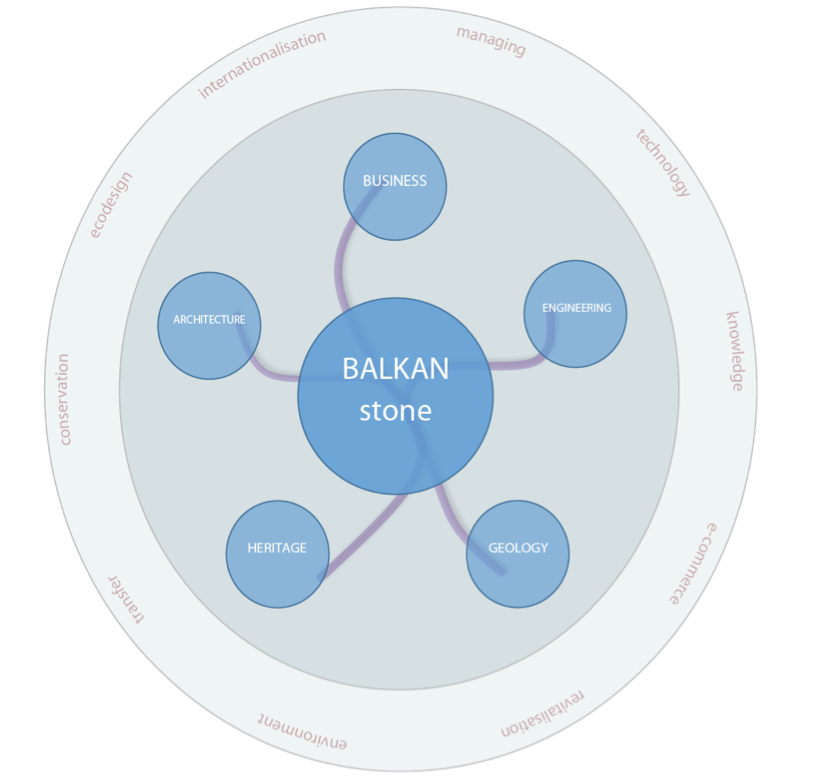BKSTONE
“Higher Education–Enterprise platform for fostering, modernisation and sustainable growth in natural stone industry in Western Balkans”
Project Description
This project addresses the needs of Balkan countries in terms or education related to the use of a natural resource as the stone, which is quite important for the development of the economy in the Mediterranean countries
In the quarrying of the stone, the lack of prepared hands-on engineers in this area makes that the local companies face a lot of problems to compete in the international markets: high extraction prices because of old machinery and techniques, lack of quality in the products (excessive use of explosives that finally produce the braking in the molecules, what makes the stone to easily split when placed in the final destination, or when workers are placing it, what brings not only quality problems, but also security problems for the workers themselves), high number of accidents in the quarry due to the high use of ht explosives, instead of modern machinery based in the diamond wire; important environment impact in the quarry (dust, mud, etc.).
In a third dimension, the manufacturing of the stone, also required specialized knowledge to be able of producing materials with the quality level required by the national and international markets. Same when we talk about the placing of the stone. We can see in these countries as in some public places the stone floor is broken, giving in this way a bad image of this material, when the only problem is a placement work performed without consideration the European standards and the commonly use codes of practice.
To this we must add the importance of the education related to the restoration of the historical buildings, many of them built using stone. This makes that some of the few works being carried out even if externally seems to have fixed some problems, because of using old techniques the intervention in the building give rise to future important problems, as has happed in most developed countries with the interventions carried out in the middle of last century. This happens meanly due to the use of unsuitable materials or techniques.
The lack of qualified staff in the higher education has even a worst impact when we combine it with the lack of qualified staff in the vocational levels, particularly for manufacturing or carving of the stone and for its placement in the final destination.
The global problem of lack of skilled staff in all levels is even bigger because of the lack of relation between the universities and the domestic companies, which makes that there is not a real transfer of knowledge between then.
Based on the knowledge of the programme countries partners involved in this project regarding the reality and needs of stone industry in the international countries and in the Balkans, some researchers have been performed in the Balkans, and the results are that Balkan countries, which the most of the area is covered by mountain ranges running from north-west to south-east, have important marble resources along the whole cost, but also, mainly inland, granite, limestone and sandstone.
It is important to state here that the development of the stone industry in the Balkans require also that the development goes hand by hand with the industry, developing and sharing knowledge between academic and economic agents, and having also in mind the currently important requirement of being environmentally friendly and based in circular economy principles. This requires still more specialized knowledge, currently totally unavailable in the Balkan countries, but being quickly developing in the EU countries, being Italy, Spain and Greece leading countries in this area.
Objectives
BKSTONE project has the main objective of fostering the modernization and development of the stone sector in Western Balkans partner countries through strengthening the relationship between the higher education institutions and the industry, and internationalizing curriculum and methods.
To meet the requirements of current international demand of natural stone products according to EU standards, the partner countries industry has to perform important changes in quarrying methods, processing methods, quality controls following European and international standards (p.e. CE marking, ASTM, etc.), marketing strategies, international trade, e-commerce etc. These changes require the participation of all local agents, including the Higher Education Institutions (HEI) and Vocational Education and Training (VET) organizations, which should develop their training strategies to meet the challenges explained in the rationale of our project in terms of quality, delivery and especially relevance, in response to the industry needs.
EU PARTNERS
- University of A Coruña – Technichal Architerture – A Coruña – Spain
- CTM- Centro Tecnológico del Marmol de Cehegin – Murcia – Spain
- Conselleria de Educación, Universidad y Formacion
- Profesional / IES Ribeira do Louro – Galicia
- University La Sapienza – Italy
- Scuola Edile Padova – Italy (Vocational Training School)
- National Technical University of Athens – Greece
- Transilvania University of Brasov – Romania
BALKAN PARTNERS
- Universiteti Politeknik I Tiranes – Albania – PROMOTER
- University of Elbasan “Aleksander Xhuvani”– Albania
- University of Gjirokastër “Eqrem Çabej” – Albania
- University of Sarajevo – Architecture – Bosnia & Herzegovina
- University of Mostar – Civil Engineering – Bosnia & Herzegovina
- Kolegji Nderkombtar per Biznes dhe Teknologji – Architecture and Engineering – Kosovo
- University of Pristine –Kosovo
- University Mediterranean Podgorica – Montenegro

